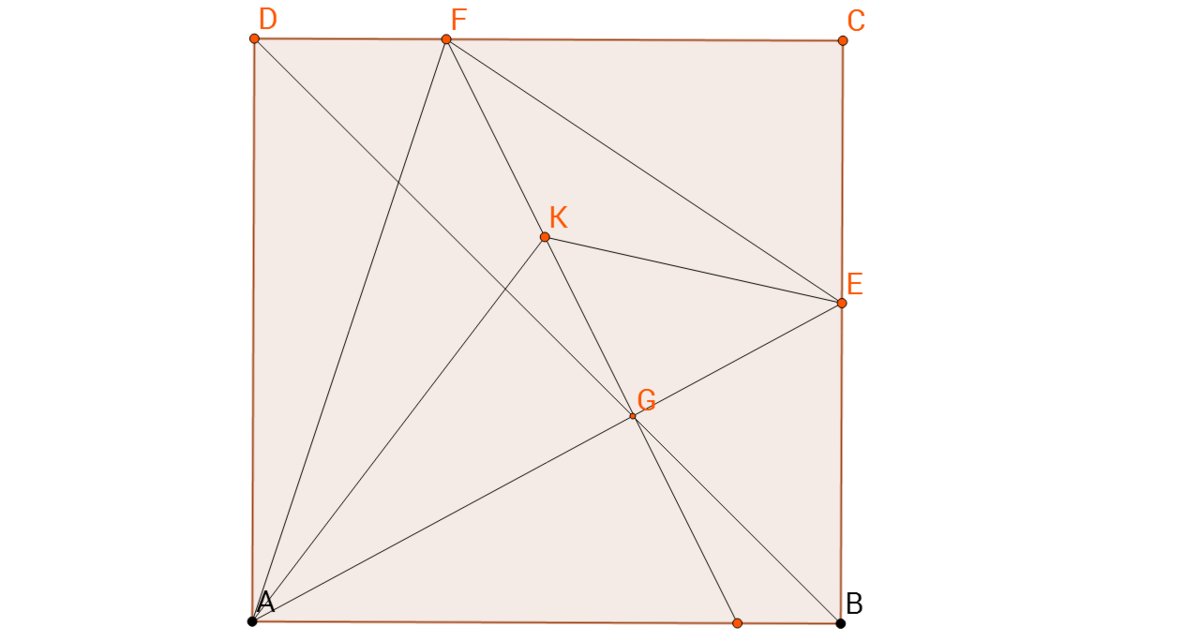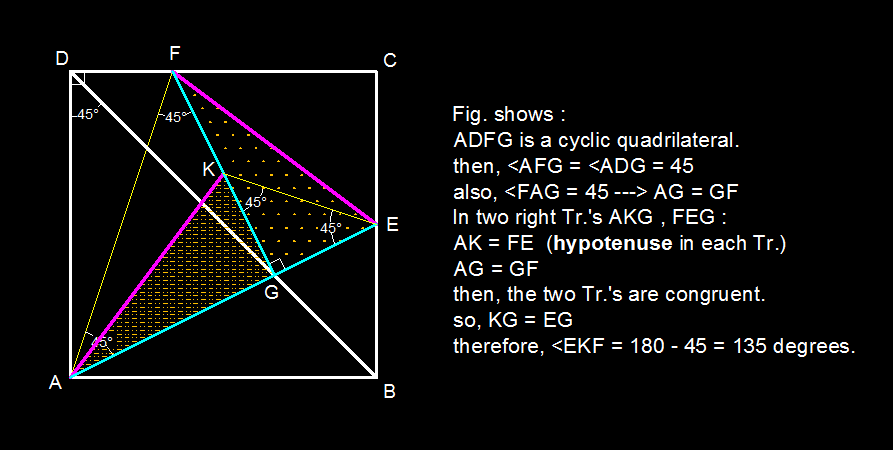Good analytical geometry from
In the figure below,

A B C D is a square. E and F are points on B C and C D respectively such that A E cuts the diagonal B D at G and F G is perpendicular to A E . K is a point on F G such that A K = E F . Find the measure of angle E K F in degrees.
The answer is 135.
This section requires Javascript.
You are seeing this because something didn't load right. We suggest you, (a) try
refreshing the page, (b) enabling javascript if it is disabled on your browser and,
finally, (c)
loading the
non-javascript version of this page
. We're sorry about the hassle.
3 solutions
Since ∠ A G F = 9 0 o and ∠ A D F = 9 0 o , it follows that A D F G is a cyclic quadrilateral. Hence ∠ G A F = ∠ G D F = 4 5 o . Thus the triangle A G F is isosceles and A G = G F . In the right angled triangles A G K and F G E , we have A K = E F and A G = G F . Hence they are congruent and G E = K G . Consequently, the right angle triangle K G E is isosceles and ∠ E K G = 4 5 o . Thus
∠ E K F = 1 8 0 o − ∠ E K G = 1 3 5 o
I think you have to prove congruency.
I think the main part of the solution should be the proof that the triangles are congruent.
Log in to reply
The proof is left to the reader.
Also I did same thing to prove congruency as done by Ahmad Saad.
Log in to reply
If the proof is left to the reader, what's the point of even writing a solution. You didn't even give an outline of your proof that those two triangles are congruent.
Log in to reply
@Anupam Nayak – Ok. I am sorry for NOT RIGHTING THE COMPLETE SOLUTION. I have edited it.
Also don't be so rude and force me to write the solution of my own problem. It's my choice whether to write the solution or not. If you are the top ranker of RMO, INMO, IMO, AIME, USAMO : then why don't you post the solution? Neither you are the staff of BRILLIANT nor are you the moderator who can force me to post the solution. So, please mind your language.
You can downvote my solution, if you want. I will not say anything, but you cannot force me rudely to post the COMPLETE SOLUTION .
Log in to reply
@Priyanshu Mishra – I'm sorry if that sounded rude. I was not forcing you to write the complete solution, I was just trying to help you make the solution better. I'm sorry again.
Log in to reply
@Anupam Nayak – If this was your intention, then no problem.
Thanks for forcing me. lol, I became active after that in writing complete solutions. : )
Hey brother, how will you price the congurency.
Log in to reply
The proof is same as that of Ahmad.
Also I felt lazy to type the congruency proof , so I left it.
Log in to reply
Lol, you on Slack? I want to talk to you.
Log in to reply
@Department 8 – What is slack?
I just opened it once but not knew that i had been added.
Can you tell me how to go on 'SLACK CHAT''? What is the url?
Log in to reply
@Priyanshu Mishra – Go to brilliant-lounge.slack.com and sign up. If this does not work then ask Calvin sir.
Log in to reply
@Department 8 – I have been welcomed to on slack chat.
Now how to chat with you?
using coordinate geometry and letting e be(1,t) then g is (1/1+t,t/1+t) f is(1-t/1+t,1) ok=fe =(t^2+1)/t+1 which gives kg which we find=ge
Moderator note:
Since it's a proof by coordinate geometry, you would have to provide all of the values that you calculated, instead of just saying "gives kg which we find = ge".
Thanks for the brief solution.
